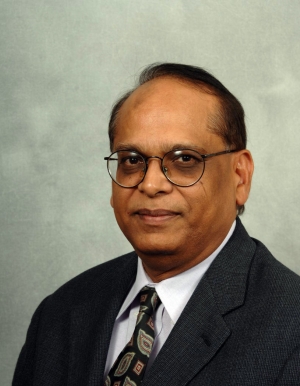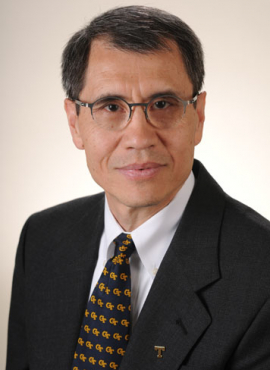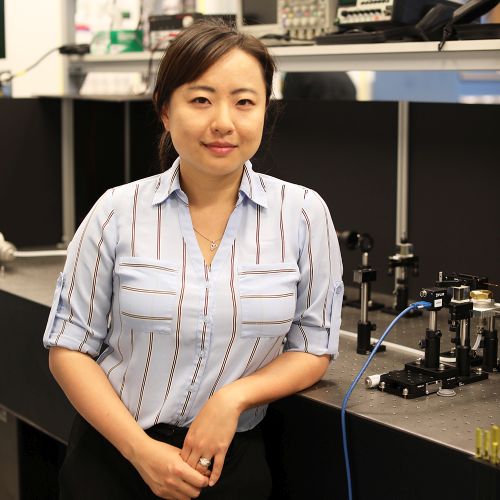Wiley Holcombe

Autonomy

Autonomy

Autonomy

Autonomy

Dr. J.V.R. Prasad is a professor in the School of Daniel Guggenheim School of Aerospace Engineering at the Georgia Institute of Technology working in the area of flight mechanics and control. He received his B.Tech degree from the Indian Institute of Technology, Madras, India and his M.S and Ph.D. degrees from the Georgia Institute of Technology, Atlanta, USA. He is currently a co-principal investigator and the associate director for the US Army, Navy and NASA sponsored Vertical Lift Rotorcraft Center of Excellence (VLRCOE) program at Georgia Tech. He has extensive research and design experience in rotorcraft system modeling and control, propulsion system modeling and control, and autonomous air vehicle modeling and control. He published parts of four books, sixty refereed journal papers, more than 250 conference papers and 80 research project reports. He has 18 invention disclosures and five patents to his credit. He is a recipient of the 2009 Melville Medal award from the American Society of Mechanical Engineers (ASME) and the 2015 Aero Lion Technologies Outstanding Journal Paper award from the International Journal of Unmanned Systems. He served as the editor-in-chief of the Journal of the American Helicopter Society (AHS), chair of the Handling Qualities and UAV Tech Committees of the AHS, and as member and secretary of the Atmospheric. Flight Mechanics Technical Committee of the American Institute of Aeronautics and Astronautics (AIAA). He currently serves as a member of the editorial board for the International Journal on Mathematical Modeling and Simulation and the advisory board for the International Journal of Unmanned Systems. He is a Fellow of the AIAA, a Technical Fellow of the AHS and a member of the ASME.
Flight Mechanics & Controls

E. Glenn Lightsey is the John W. Young Chair Professor in the Daniel Guggenheim School of Aerospace Engineering at Georgia Tech. He currently serves on the executive committee for the Space Research Initiative at Georgia Tech. Previously, he was the director of the Space Systems Design Lab from 2016-2023 and Center for Space Technology And Research at Georgia Tech from 2019-2023.
Lightsey’s research program focuses on the technology of small satellites, including: guidance, navigation, and control systems; attitude determination and control; formation flying, satellite swarms, and cooperative control; proximity operations and unmanned spacecraft rendezvous; space based Global Positioning System receivers; radionavigation; propulsion; satellite operations; and space systems engineering. His group has built and operated several spacecraft for government sponsors.
Lightsey has co-authored more than 180 technical articles and publications, including four book chapters. He is an AIAA Fellow and a Founding Member of the AIAA Small Satellite Technical Committee. He is Associate Editor-in-Chief of the Journal of Small Satellites. In the past he served as Associate Editor of the AIAA Journal of Guidance, Control, and Dynamics and Associate Editor of the AIAA Journal of Spacecraft and Rockets. Lightsey was previously employed at the University of Texas at Austin and NASA’s Goddard Space Flight Center.
Small Satellites, Guidance and Control, and Spacecraft Technology.

Chen Zhou is the associate chair for undergraduate studies and associate professor in the Stewart School of Industrial and Systems Engineering at Georgia Tech.. Dr. Zhou's research focus includes sustainable supply chain, distribution system design and manufacturing systems. Dr. Chen is a member of the Institute of Industrial Engineers, Society of Manufacturing Engineers and American Society of Engineering Education. Dr. Zhou received a B.S. degree from Tianjin University (China) in 1982, an M.S. in mechanical engineering from Pennsylvania State University in 1984, and a Ph.D. in industrial engineering from Pennsylvania State University in 1988.
Warehousing design and analysis; Manufacturing Systems

Nancey Green Leigh is a Professor in the School of City and Regional Planning and adviser for the economic development planning, working with masters and doctoral students. Maintaining an active research program, Leigh is currently leading a project entitled "Workers, Firms and Industries in Robotic Regions," funded by the National Science Foundation's Robotics Initiative. She previously led a large scale research effort by three universities focused on sustainable industrial systems for urban regions. Both of these efforts as well as other funded research (brownfields, urban land and manufacturing, resilient infrastructure) contribute to Leigh's long term focus on advancing sustainable development for local and regional economies. As Associate Dean for Research, Leigh is focused on strengthening the research impact of the College of Design. She develops and administers competitive initiatives to support individual and collaborative research by college faculty and affiliated researchers. She oversees the college's seven major research units. She also is engaged in building research connections within Georgia Tech between the College of Design, other colleges and Interdisciplinary Research Institutes, as well as to external funders and collaborators in the public, private and nonprofit sectors. Leigh has published more than 60 articles and four books, Routledge Handbook of International Planning Education (2019 with S.P. French, S. Guhathakurta, and B. Stiftel), Planning Local Economic Development, 6th edition (2017 with E.J. Blakely) adopted for courses in a wide array of universities; Economic Revitalization: Cases and Strategies for City and Suburb (2002 with J. Fitzgerald); and Stemming Middle Class Decline: The Challenge to Economic Development Planning (1994). She was co-editor of the Journal of Planning Education and Research from 2012 to 2016, and was elected a Fellow of the American Institute of Certified Planners in 2008.
economic development; robots & AI impact on workers; firms & regions; City and Regional Planning; System Design & Optimization; Design Sciences

Dr. Mazumdar started at the Woodruff School of Mechanical Engineering at Georgia Tech in January of 2019 and currently has a courtesy appointment with the Guggenheim School of Aerospace Engineering. She graduated with her Ph.D. from Massachusetts Institute of Technology and completed a postdoctoral appointment at Sandia National Laboratories in the Diagnostic Science and Engineering group. Her research interests include the design of new diagnostic techniques and sensor systems for studying combustion, multiphase flows, hypersonic flows, and energetic materials. Her group utilizes new composite sensing materials, optical diagnostics, magnetostatics, and system identification methods to study these complex physical phenomena.
new sensor systems diagnostic techniques; robotic; biomedical; hypersonics

Marilyn Smith is a Professor in the School of Daniel Guggenheim School of Aerospace Engineering at the Georgia Institute of Technology. She is director of Georgia Tech's Vertical Lift Research Center of Excellence (VLRCOE), where she leads a seven-university team of experts in vertical lift research for the U.S. Army, U.S. Navy and NASA. She has partnered with the Georgia Tech Research Institute (GTRI) to successfully win multiple research funding mechanisms for both organizations that total more than $200 million dollars. As the director of the AE School's Computational Nonlinear Computational Aeroelasticity Lab, Prof. Smith leads an internationally recognized and award-winning research team in the areas of unsteady aerodynamics and computational aeroelasticity using Computational Fluid Dynamics (CFD) across rotary-wing, fixed wing and launch vehicles, as well as sustainable energy. As a member of the NASA FUN3D development team, Prof. Smith contributes to state-of-the-art unstructured algorithm development, in particular for overset, moving frames. As an affiliate of the Aerospace Systems Design Lab (ASDL), she helps to integrate high performance computing with the design process. Prof. Smith is the author or co-author of more than 200 technical publications, and her research products are in active use by the US Government and other organizations, including the Drone Racing League. She is active internationally on three NATO AVT Panels investigating nonlinear gusts behaviors on UAVs and collaboration of experimental/computational aerodynamics. She is on Board of Directors of the Vertical Lift Consortium (VLC) and the Vertical Flight Society (VFS). She is also the Deputy Technical Director for Aeromechanics for the VFS. Prof. Smith has demonstrated her leadership as ARO Dynamic Stall Workshop Chair (2019); 70th AHS Annual Forum Technical Chairperson (2014); 69th AHS Annual Forum Technical Deputy Chairperson (2013); and 2014 Overset Grid Symposium (OGS) Chairperson. She was a member on the first International Aeroelastic Prediction Workshop Organizing Committee and is a member of the OGS organizing committee. Prof. Smith has been a guest expert in aviation for National Geographic, PBS, and NPR, as well as local television and numerous publications.
aeroelasticity; aerodynamics; computational fluid dynamics

I am an Assistant Professor at the School of Interactive Computing in the College of Computing. I am also affiliated with the Georgia Tech Research Institute and serve as an Associate Director of ML@GT which is the machine learning center recently created at Georgia Tech. Previously I was a Research Scientist at SRI International Sarnoff in Princeton, and before that received my Ph.D. in 2010 with Professor Ron Arkin as my advisor. I lead the RobotIcs Perception and Learning (RIPL) lab. My areas of research specifically focus on the intersection of learning methods for sensor processing and robotics, developing novel machine learning algorithms and formulations towards solving some of the more difficult perception problems in these areas. I am especially interested in moving beyond supervised learning (un/semi/self-supervised and continual/lifelong learning) as well as distributed perception (multi-modal fusion, learning to incorporate information across a group of robots, etc.).